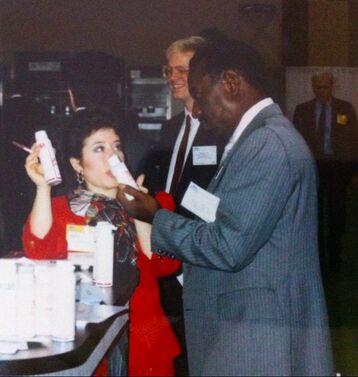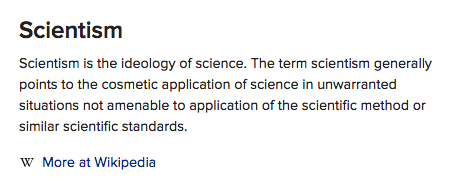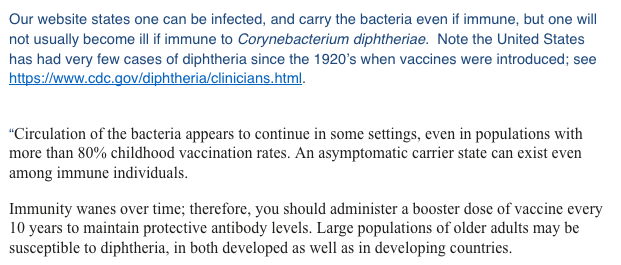| I used to work as a microbiologist for a global pharmaceutical company. My position was unique because I worked with both the marketing and the scientific sides. Usually these are completely segregated areas, and only employees higher up in the ranks and far more invested in the company's success get to see all of what |
I saw. But this enabled me to appreciate this bigger picture before I was, "educated" to not find it problematic: How companies create biased science and then use it to shape public health policy.
Too often, interventions with risks that outweigh the benefits, have become the standard of care. After all -- there is money to be made. Examples of this were the mass removal of healthy children's tonsils, by-pass surgery for stable angina, anti-depressants, opioids and Vioxx. Given all this history why are we so quick to call those who question the facts related to any medical intervention "Anti-science"?
Now don't get me wrong. There are people who really are "anti-science." They may reject the scientific method, want creationism taught in science classrooms and deny climate change. For those of us who value the scientific method as a way of discerning what is true, it is terrifying to witness the dismantling of environmental protections by politicians empowered by people that truly are anti-science. I can appreciate the desire to declare ourselves, "Pro-science" in response to what is going on. But too often this label is actually supporting scientism rather than science.
Now don't get me wrong. There are people who really are "anti-science." They may reject the scientific method, want creationism taught in science classrooms and deny climate change. For those of us who value the scientific method as a way of discerning what is true, it is terrifying to witness the dismantling of environmental protections by politicians empowered by people that truly are anti-science. I can appreciate the desire to declare ourselves, "Pro-science" in response to what is going on. But too often this label is actually supporting scientism rather than science.
We may call ourselves "pro-science" as a means of virtue signalling to others that we are not a religious fanatic, nor someone who rejects evidence of climate change. The problem however is that we are in a very polarized environment. In this context, virtue signalling like this can short circuit everyone's critical thinking -- especially when it appears to support our side's over-all perspective. But when the term, "anti-science" is used to shut down a conversation -- that is when it can become dangerous to everyone's well-being. We need to be able to question our own side's rhetoric -- as it may not always be accurate! Particularly troubling is how when it comes to vaccines and GMO's, thoughtful, intelligent, public-service-minded people are being marginalized for expressing concern. Also on these two issues in particular, scientifically inaccurate statements are repeatedly promoted in the media. Then when someone tries to point out what is factually incorrect they get labeled, "anti-science" and marginalized. That is scientism, not science. Now ask yourself..."Who does this benefit?" (Not those seeking justice, freedom or well-being...only entrenched powerful entities -- like the pharmaceutical and chemical industries!)
One example of the media promoting unscientific, dogma can be found in a recent CNN article. A spokesperson for the World Health Organization's Vaccine-Preventable Diseases and Immunization Programme made a completely unscientific statement and the media broadcast it around the world giving it further credibility. Here is a screen shot of the offending quote:
Don't feel badly if what is false in that quote doesn't jump out at you. I noticed it because I happened to remember specific material presented in my immunology class over 35 years ago. At first I wondered if I was remembering incorrectly, or if new science had emerged that I didn't know about.
To help you understand what I noticed -- I'll review a bit about vaccines. Most vaccines prevent disease by causing our body to make antibodies to the bacteria or virus that causes the disease. But Diphtheria and Tetanus are unique among vaccines. They don't cause our body to make antibodies to the germ that causes the disease, and thus preventing it from replicating or being spread. Instead, these vaccines prompt us to make antibodies only to a toxin that the bacteria makes. These vaccines are not designed to attack the bacteria, their only action is to stop the dangerous toxin these germs make from moving freely in our bodies and injuring our tissues.
That is why that statement by the WHO spokesperson caught my attention. He was clearly seeking to promote the view that unvaccinated people are putting everyone at risk of Diphtheria -- a disease with a far more deadly history than measles.
Curious about this, I began asking my scientist and doctor friends these questions:
| "What basis is there to suggest that someone not vaccinated against Diphtheria poses more of a risk in the community than someone who is vaccinated? "If there is a mechanism by which this vaccine could contribute to herd immunity, can you please explain it to me?" |
Most told me that these were a very good questions -- and ones that they could not answer. But a few went further and said things like this:
And another said this:
These answers just didn't make sense in light of the facts I knew. I began to wonder:
- Could anyone provide a scientific mechanism to explain how antibodies to just the toxin could possibly reduce circulation of Diphtheria bacteria in the population?
- How widespread was this fallacious dogma among public health officials?
Next I called the local health department. At first the people I spoke to said things similar to my friends. But when I pointed out the leaps in logic and pressed for more explanation, they admitted that they did not know. I was told someone more knowledgeable would have to call me back. So then I began calling health departments in multiple other states. The same exact thing happened over and over. Either they couldn't or wouldn't answer this question. Several suggested I contact the CDC. So I did. Here is a screen shot of an official response from the CDC:
It is clear from this, that the benefits of this vaccine are limited only to the individual that is vaccinated. There is not even a theoretical basis to suggest that herd immunity can exist for this vaccine. In fact -- to the extent that this vaccine is truly effective -- it could be argued that it is the vaccinated individual who presents the greater threat to those unable to get this vaccine or in whom it fails to be effective. Why? Because if those who have been vaccinated come in contact with Diphtheria, it can spread in their body and they can then infect others -- without showing any symptoms themselves! (This has been documented with Pertussis too.) In comparison -- those who have not had the vaccine would be more likely to appear sick -- and could thus be avoided by infants too young to get the vaccine and the immunocompromised.
Why would a representative of the WHO make such a clearly incorrect statement? Are they really that ignorant of the basic science, or just ok with perpetuating falsehoods in order to influence the masses to do what they believe we should? Are their efforts primarily to support public health or pharma?
Given how many older people have not had a Diphtheria booster in decades, and all those dangerous, "anti-vaxxers" who have never had this vaccine at all, don't you think it is worth asking...why have there been almost no cases of Diphtheria in the US? it has been documented to still be endemic in some parts of the country. And we know it has been imported. Could there be factors other than vaccination coverage that impact not only the prevalence of historically dreaded infectious diseases -- but also their mortality? Scarlet Fever declined and we never had a vaccine for it. TB was on the decline for many years as well -- and again we never vaccinated for it here either.
Whooping Cough adds a fascinating perspective to all this. Up until very recently the narrative the public heard was that the vaccine had eliminated whooping cough. But that was not true. Published studies suggest whooping cough has been endemic in the US all along. (1) (2) and never went away. It was just that when doctors believed the vaccine was effective they did not diagnose it. When someone came in with symptoms consistant with whooping cough, they got a presumptive diagnosis of RSV, bronchitis, pneumoia or something else. It was only once enough people challenged this narrative -- and pointed out the published science that doctors began to diagnose whooping cough. But the media framed it as the disease was making a comeback and anti-science-anti-vaxers were to blame.
But the science actually documents that Whooping Cough was endemic and common all along in highly vaccinated populations. So any suggestion that people choosing to not get that vaccine, are putting others at risk is a complete lie. On top of that we know every medical intervention has a unique cost-benefit analysis. This analysis will be different for each person, and may vary from place to place depending upon many factors including access to medical services, sanitation, access to food and more. If we don’t think critically for ourselves – then we are vulnerable to becoming pawns for powerful entities capable of manipulating public perception.
What else are public-health experts getting wrong?
Why would a representative of the WHO make such a clearly incorrect statement? Are they really that ignorant of the basic science, or just ok with perpetuating falsehoods in order to influence the masses to do what they believe we should? Are their efforts primarily to support public health or pharma?
Given how many older people have not had a Diphtheria booster in decades, and all those dangerous, "anti-vaxxers" who have never had this vaccine at all, don't you think it is worth asking...why have there been almost no cases of Diphtheria in the US? it has been documented to still be endemic in some parts of the country. And we know it has been imported. Could there be factors other than vaccination coverage that impact not only the prevalence of historically dreaded infectious diseases -- but also their mortality? Scarlet Fever declined and we never had a vaccine for it. TB was on the decline for many years as well -- and again we never vaccinated for it here either.
Whooping Cough adds a fascinating perspective to all this. Up until very recently the narrative the public heard was that the vaccine had eliminated whooping cough. But that was not true. Published studies suggest whooping cough has been endemic in the US all along. (1) (2) and never went away. It was just that when doctors believed the vaccine was effective they did not diagnose it. When someone came in with symptoms consistant with whooping cough, they got a presumptive diagnosis of RSV, bronchitis, pneumoia or something else. It was only once enough people challenged this narrative -- and pointed out the published science that doctors began to diagnose whooping cough. But the media framed it as the disease was making a comeback and anti-science-anti-vaxers were to blame.
But the science actually documents that Whooping Cough was endemic and common all along in highly vaccinated populations. So any suggestion that people choosing to not get that vaccine, are putting others at risk is a complete lie. On top of that we know every medical intervention has a unique cost-benefit analysis. This analysis will be different for each person, and may vary from place to place depending upon many factors including access to medical services, sanitation, access to food and more. If we don’t think critically for ourselves – then we are vulnerable to becoming pawns for powerful entities capable of manipulating public perception.
What else are public-health experts getting wrong?







